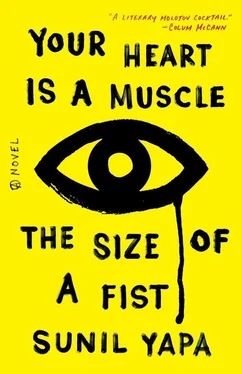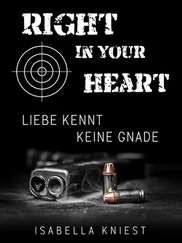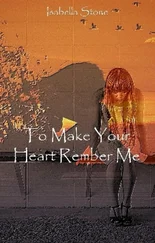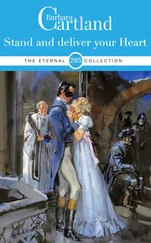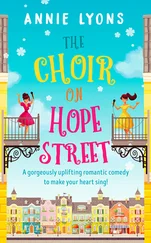He heard Ju on the other side of the ’Keeper, cursing, saying, “What the heck was that? A soup can? Was that what they just hit me with? A freaking can of soup?”
Not thinking how are we going to get out of here. Not thinking because he didn’t have time to think, what is a choice and what is not because here he was standing atop the PeaceKeeper, while the crowd surged and screamed, and down below him on the front hood was the Chief himself. The Chief, who right this very moment was swinging with his baton, unaware that the very same kid that Park had nearly busted this morning for selling weed was headed right toward him. That skinny black kid with the braids and the olive green jacket. There he was making his way through the crowd, headed straight for the Chief. The kid with the strangest, weirdest sort of grin on his face. He looked happy. And the Chief — did the Chief even see the kid? No time to ask. The kid looked nuts and Park lifted his shotgun and placed the barrel on a line that connected him, Officer Timothy Park and his weapon, to the black kid in the street with the crazy-ass grin. He would protect his Chief. Because that’s what a good cop did. A good sane rational cop who understood how things worked. He closed one eye and cocked his head to the barrel. Sighted on the kid, who the closer he got to the Chief, the nuttier he looked. He was about twenty feet out now. Dang, Park thought as he sighted and took a breath, preparing to squeeze the trigger on the downward slope of his exhale, kid is so crazy it looks like he wants to hug the old man.
What a fucking world.
Bishop knew he had not necessarily been the best father. He had raised his adopted son as though he were his own. More than his own child. He had loved Victor, when he was young, as though he were a living part of the man himself. And yet he was not tender, exactly. No, he raised his son to be the man he knew he would need to be. To have done different would have been a disservice to the boy. A mercy he could not afford.
He had grown up poor, Victor, and this the boy did not seem to regret or resent. He never said his mother should have provided him more. She should have bought him and fed him and given him more, because she did feed him, feed her son, and she did love him, love her son, and if he didn’t have the fashionable clothes, Suzanne had said he didn’t need to be another asshole in two-hundred-dollar sneakers.
But then Suzanne died and Bishop bought his son the shoes, the shoes that were for assholes and the shoes that were on his hero’s flying feet, but Victor left them in the box wrapped in paper. It was a gesture of love and defiance, was how Bishop saw it, and then his boy disappeared and maybe, Bishop thought, he should never have bought him the shoes. Maybe he didn’t know a goddamn thing about his son.
How can you protect your children if they don’t want to be protected? How can you protect your children if the thing from which they need protection is you?
Bishop had once stumbled on him, surprised his son in his room with his head buried in the orange box, inhaling the odor of rubber and new leather and imagining what?
When he raised his head from the box and saw his dad standing in the doorway, the thing he wanted to know was did he think the world was a good place?
Did Bill Bishop think the world was a good place?
For whom, dear son?
And yet they were happy for a time, the three of them. Fifty-nine years old and it had been a good life. He had a wife he loved, a happy home, a good kid with good grades heading to a good college when that day came. And then Suzanne was gone and everything gone with her — his son, his family, his belief that the world made some kind of sense, that justice prevailed. She left and the gravity from beyond just pulled him inside out. Left his guts hanging in the wind.
His silences engulfed him. And into that silence he threw his son.
Victor came to him one evening, a little less than a year after her death, some sort of ticket clutched in his trembling hand. “Dad, I’m not going to college,” he said.
“And why is that?”
“I’m going to Guatemala.”
“And why is that?”
“I don’t know exactly.”
“And what do you hope to find there?”
“I don’t know.”
“Is this about me burning your mother’s books?”
“No.”
He was a month past his sixteenth birthday. He was a child and a fool. But what were you going to say? Bishop sensed that he had already lost him; failed to protect him in some crucial sense. But it was exactly this knowledge he could not allow himself to see or speak. This traveling — it was merely a boy’s bluff against his father. A more sophisticated version of the play Victor had enacted at fourteen following his mother’s death: running away from home every three weeks with the regularity of clockwork. Various sheriffs picked him up in his hovels of rebellion and brought him back: hitchhiking on the I-90; burgling a house on the outskirts of the UW campus; in the Great Northern train yard, trying to jump a freight. He never escaped a radius of more than thirty miles, and they always brought him back home.
He wanted to say, Victor, go to college.
He wanted to say, Son, the world is not hard. It is awful.
But how could he, a white man, truly prepare his son for that bleak knowledge which was coming? White man. Black son. Bishop hardly thought in these terms. But he knew. The world would judge Victor harshly. It was a narrow road he would have to walk. Even with all his advantages, still there was little margin for error. One mistake could cost him everything. Bishop knew. Christ, he was a cop. There is less room for forgiveness, son. Keep your hands in plain sight, son. Don’t make a sudden move, son. Don’t wear those baggy jeans, son. And no matter what, no matter what, no matter what the officer says to you, do not respond in anger. Ever. Do not lose control. Just do whatever they tell you to do, no matter how humiliating.
And did he say this to his son? Which was worse? To tell him. The necessity of telling him. To ruin that innocence. To prepare him for a future which, god willing, would not come to pass. Or to not tell him, and by not telling him ensure that that future did indeed come to pass?
Bishop remembered it so clearly. Victor standing beside the stainless steel refrigerator and holding a plane ticket and staring at his father as if he were a person he had never seen before. A strange man who had put on glasses and taken up residence in his home. Or perhaps it was more accurate to say Victor was looking at him as though seeing him for the first time.
And what did Bishop say?
He adjusted his glasses and went back to his paper and said, “Well, who’s stopping you, son?”
Victor would have to learn his own lessons.
“Your mother would be very disappointed.”
Bishop’s radio babbling.
Gasoline
Bishop
Kerosene and ninjas.
Gasoline. Stolen gasoline.
Bishop Bishop Bishop
Snipers and kerosene.
Bishop pointing and Park firing. Another protester went down in a heap. He switched the radio off and felt an odd immediate relief. Thank fucking god.
A protester stepped from the crowd and a space seemed to clear. A burning dumpster was behind him, and in the flickering light Bishop saw bars of shadow across his body and he looked something like his son might have looked waking up from a nap, thirty pounds lighter and covered in oil-flecked grit. Flames huge behind him.
His face hidden in the hood of an olive green jacket. He was yelling something at the PeaceKeeper. The crowd was chanting. Surging toward the hotel.
Rain in the air and no small number of memories suddenly pressing in on him, ghosts rising through the smoke, the creak and haul of riot, and Bishop seeing none of it. Seeing only the white shoes polished to a shine. All week he had watched the faces of the city pass. How many he seemed to recognize! And from each familiar face bloomed a memory, a shock of emotion that buzzed around his skull. All week he had walked and wandered, he had watched and waited for that one face to pass — Victor.
Читать дальше
